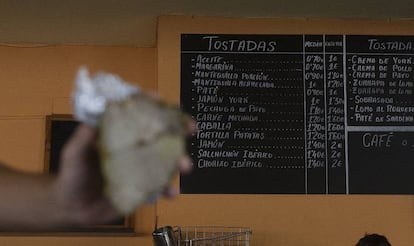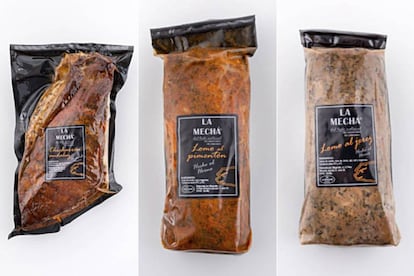British tourist may be first listeriosis case outside Spain: Health Ministry
The man is thought to have consumed the ‘carne mechada’ at the center of the current outbreak while in Andalusia before traveling to France, where he was hospitalized

The Health Ministry on Monday confirmed the first possible case of listeriosis outside of Spain as part of the current outbreak, which has so far affected 200 people throughout the country. The potential victim is a Briton who may have become infected with the bacteria while in the focal point of the ongoing outbreak, Andalusia, before traveling to France, where he was diagnosed with listeriosis and spent several days in hospital, then returning to his home country.
What is listeriosis?
Listeriosis is a bacterial infection that can cause severe illnesses such as sepsis, meningitis and encephalitis, and can even be fatal. Those most at risk are pregnant women, the elderly, unborn babies and newborns, or people whose immune systems are compromised. The infection can also cause gastroenteritis and fever. It is primarily transmitted, as in this current outbreak in Spain, by the ingestion of contaminated foods.
EL PAÍS has also learned that the oven cart used at the Seville-based company at the center of the outbreak, a firm called Magrudis, has tested positive for the bacteria Listeria monocytogenes. Last week, EL PAÍS revealed that tests carried out on larding needles used by Magrudis to make a pork loin product called carne mechada also returned positive results for the presence of the bacteria. It was this product, thought to be at the center of the outbreak, that the British tourist consumed while in Spain.
The preliminary test results on the oven cart have been obtained by the municipal laboratory of Seville City Hall, which is continuing to analyze dozens of samples taken from inside the plant to determine the origin and date of the outbreak.
The oven cart is a key element in the food plant, and is used at various stages of the production chain, both before and after the products are cooked. The samples that tested positive for the bacteria were taken after the roasting process. “This corroborates the fact that listeria was found in the entire plant,” explained José Juan Rodríguez, a professor in nutrition and bromatology at Barcelona’s Autonomous University.
Carne mechada is made by cooking pork loin in its own fat. The lard is introduced into the meat using larding needles before it is cooked. It is then usually served cold and in thin slices.

“It was present in the larding needles and now it’s confirmed that is in the cart. This indicates that it could be on the food-preparation tables and that many other products could be contaminated,” warned Rodríguez.
Refurbishment at Magrudis plant
On July 31, Magrudis informed the Andalusian regional government – which is headed up by the conservative Popular Party and Ciudadanos, with support from the far-right Vox – that it had expanded its headquarters in the El Pino industrial area on the outskirts of Sevillle, work that needed to have been previously approved by the regional government. In its statement, the firm assured that it had maintained its “technical sanitary conditions” and self-control system as the work was being completed. This statement was sent 15 days after the date considered by the regional government to mark the beginning of the outbreak.
Magrudis sells carne mechada, along with other similar products – such as lomo, preserved pork loin, and chicharrones, pork belly – under the brand name La Mechá. Seville City Hall confirmed on Friday that two other La Mechá products were found to be contaminated: pork loin with sherry, and pork loin with paprika. Samples taken on August 21 from four other products – Andalusian chicharrón, mantecá colorá (orange-colored pig fat cooked with pork and spices), zurrapa de lomo (fried pork loin in butter and salt) and zurrapa de hígado (pork liver spread) – have tested negative for listeria, EL PAÍS has been informed.
On Sunday, 10 days after the alarm was first raised by the health authorities about the outbreak, Magrudis released its first press release, claiming it was “in a state of shock” and “couldn’t explain what had happened.” According to the food company, they complied with all sanitary obligations and have a lab report from days before the product was packaged that showed it tested negative for the bacteria.
The press release came a day after the first tests on carne mechada produced by Magrudis and sold on to a firm called Comercial Martínez León for resale also revealed the presence of listeria. These products were in circulation with an own-brand label until they were ordered to be withdrawn on August 21.
All clients of Comerical Martínez León have since been contacted by the owner, according to municipal sources, but it is not known how much carne mechada was distributed. The authorities were not aware that the product had been sold on to Comerical Martínez León until August 21, six days after the initial health alert was raised.
What’s more, the carne mechada sold by Martínez León for resale was incorrectly labeled, according to the Spanish Agency of Food Safety and Nutrition (Aesan). “It has the same presentation as the [carne mechada] sold by Magrudis, no brand appears on the label and only the nutritional information is referenced,” said Aesan.
Who owns Magrudis?
Sandro Marín Rodríguez is listed in the commercial register as the owner and administrator of Magrudis, but when the company was created in August 2013, he was just a university student thinking about dropping out of a pharmacy degree. “The company isn’t his, it’s his father’s, it always has been. The son perhaps helps him now, but I had never even seen him until he appeared on television the other day,” explained one client, who wished to remain anonymous.
The father, José Antonio Marín Ponce, has three failed businesses behind him. In 1993, he had a stake in the meat-trading company Sanmasue, which declared bankruptcy at the end of the decade. In 1996, Marín Ponce founded a meat-retail business called Sierra Encina, which also had a short life. The business – which has a woman, presumably his wife, listed as the administrator – had unpaid loans in 2001 and 2003, according to the commercial register bulletin (Borme). And in 2000, he created Embutidos El Patio, which declared insolvency in 2012.
English version by Melissa Kitson.
Tu suscripción se está usando en otro dispositivo
¿Quieres añadir otro usuario a tu suscripción?
Si continúas leyendo en este dispositivo, no se podrá leer en el otro.
FlechaTu suscripción se está usando en otro dispositivo y solo puedes acceder a EL PAÍS desde un dispositivo a la vez.
Si quieres compartir tu cuenta, cambia tu suscripción a la modalidad Premium, así podrás añadir otro usuario. Cada uno accederá con su propia cuenta de email, lo que os permitirá personalizar vuestra experiencia en EL PAÍS.
¿Tienes una suscripción de empresa? Accede aquí para contratar más cuentas.
En el caso de no saber quién está usando tu cuenta, te recomendamos cambiar tu contraseña aquí.
Si decides continuar compartiendo tu cuenta, este mensaje se mostrará en tu dispositivo y en el de la otra persona que está usando tu cuenta de forma indefinida, afectando a tu experiencia de lectura. Puedes consultar aquí los términos y condiciones de la suscripción digital.








































